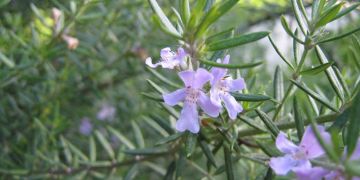It is a plant well suited to growing in poor or sandy soil, high salt, high wind areas such as the conditions found by the sea.
Rosemary's symbolic uses are deeply inlaid within many cultural traditions including weddings, funerals, and during religious ceremonies. The herb is seen by many as a gift by the gods and as a symbol of love, friendship, and trust. In modern times rosemary is grown throughout the world and is widely used as a medicinal herb and to season food.
History
Rosemary is a member of the Mint family (Lamiaceae). The first records of rosemary's use as a medicinal herb date back to ancient times in the civilizations surrounding the Mediterranean Sea. The herb was thought to have strong effects on memory and in strengthening the mind. Later accounts include that of Queen Elisabeth of Hungary, who claimed that drinking rosemary water led to her longevity as she lived beyond 70 years old while suffering from both gout and rheumatic disorder. Additional historic uses of the herb include its burning to purify the air near ill people to ward off infection during the plague, and it was also used by the French to kill germs during World War II (by utilising its aromatic/essential oil properties).
Health Benefits
Antioxidant
The rosemary herb is used in modern times to treat a variety of symptoms and illnesses. The most prominent modern use of rosemary is as an antioxidant. The primary goal of the herb in this use is to prevent the damage caused by oxidative stress that occurs during many diseases. The brain is particularly susceptible to the effects of oxidative stress, as demonstrated by the condition's role in diseases such as Parkinson's disease and Alzheimer's disease. Studies have shown that the antioxidants in rosemary, such as the carnosic and rosmarinic acids, are highly effective in combatting this problem.
Anti-bacterial
The compound also exhibits anti-inflammatory,antiviral, and antibacterial properties. The herb is used by many as a natural antibacterial and antiviral. Rosemary is touted for its ability to eliminate several harmful forms of bacteria while leaving helpful bacteria undamaged. This use of the herb is particularly effective in fighting yeast infections or candida. Rosmarinic acid is found in a variety of herbs other than rosemary, these include thyme, oregano, and peppermint.
Anti-carcinogenic
Studies have also shown that rosemary is a potent anti-carcinogenic and may play a role in treating cancer in the near future. One such study was conducted on rats and showed that rosemary, when administered in a powdered format, prevented the effects of carcinogens by 76% and decreased the incidence of tumors in mammary glands. In addition, by reducing the damage caused by ultraviolet radiation, the herb also decreases the chances of developing skin cancer.
Memory Booster
Rosemary has been thought of as a memory booster throughout history. Recent advances in the science surrounding the herb have shown that it inhibits the breakdown of acetylcholine, which is a compound that plays a role in sections of the brain responsible for memory and reasoning. Rosemary may also promote memory function by increasing blood flow to the brain.
Nutrition
Since it is also commonly used as a seasoning, there are many ways to incorporate rosemary into the typical diet. The most common method is to simply season prepared food with the herb to taste. A tea can also be made by adding two teaspoons of the rosemary leaves to hot water and allowing it to steep for 10 to 15 minutes. Herb butters and oils are made by adding the leaves or oil of the plant to the butter or oil and mixing thoroughly. Oil extract from the flowers is considered to be the best in quality. Rosemary is also available in capsule form.
Muscle Pain Relief
The leaves are often used to make tinctures that are applied directly to the skin to treat maladies such as muscle soreness and sprained ankles.





